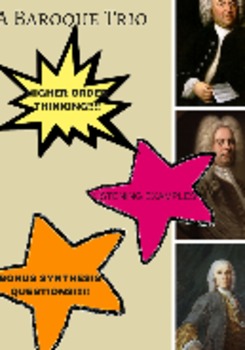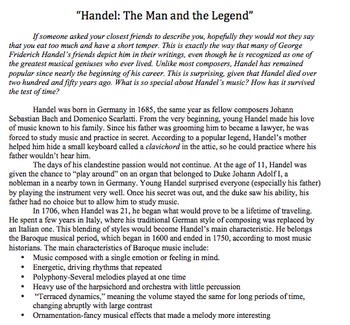Articles (3) + Higher Order Thinking Questions for Grades 7-9: Baroque Composers
IndieMusicTeacher
21 Followers
Grade Levels
7th - 9th
Subjects
Resource Type
Standards
CCSSRI.7.1
CCSSRI.7.2
CCSSRI.7.3
CCSSRI.8.1
CCSSRI.8.2
Formats Included
- PDF
Pages
9 pages
IndieMusicTeacher
21 Followers
Description
J.S. Bach, Frideric Handel, and Domenico Scarlatti.Give your students the opportunity to learn a unique perspective on these critically important Baroque-Era composers.
Together, these three original articles from IndieMusicTeacher provide students vital practice in answering higher order questions. Students are asked to determine author's purpose, make inferences, draw conclusions, and make connections (text to self and text to text).
These brief but engaging essays are written by an author whose work has been published in Music Educator's Journal and elsewhere. They would be an ideal option for students interested in music or history. Additionally, these readings are aligned with both Common Core and the Core Arts Standards, presenting a rich opportunity for arts integration.
On the last page, find three essay questions that ask students to relate the three texts in a cultural and thematic context. An excellent value!
Together, these three original articles from IndieMusicTeacher provide students vital practice in answering higher order questions. Students are asked to determine author's purpose, make inferences, draw conclusions, and make connections (text to self and text to text).
These brief but engaging essays are written by an author whose work has been published in Music Educator's Journal and elsewhere. They would be an ideal option for students interested in music or history. Additionally, these readings are aligned with both Common Core and the Core Arts Standards, presenting a rich opportunity for arts integration.
On the last page, find three essay questions that ask students to relate the three texts in a cultural and thematic context. An excellent value!
Total Pages
9 pages
Answer Key
Not Included
Teaching Duration
2 hours
Report this resource to TPT
Reported resources will be reviewed by our team. Report this resource to let us know if this resource violates TPT’s content guidelines.
Standards
to see state-specific standards (only available in the US).
CCSSRI.7.1
Cite several pieces of textual evidence to support analysis of what the text says explicitly as well as inferences drawn from the text.
CCSSRI.7.2
Determine two or more central ideas in a text and analyze their development over the course of the text; provide an objective summary of the text.
CCSSRI.7.3
Analyze the interactions between individuals, events, and ideas in a text (e.g., how ideas influence individuals or events, or how individuals influence ideas or events).
CCSSRI.8.1
Cite the textual evidence that most strongly supports an analysis of what the text says explicitly as well as inferences drawn from the text.
CCSSRI.8.2
Determine a central idea of a text and analyze its development over the course of the text, including its relationship to supporting ideas; provide an objective summary of the text.



